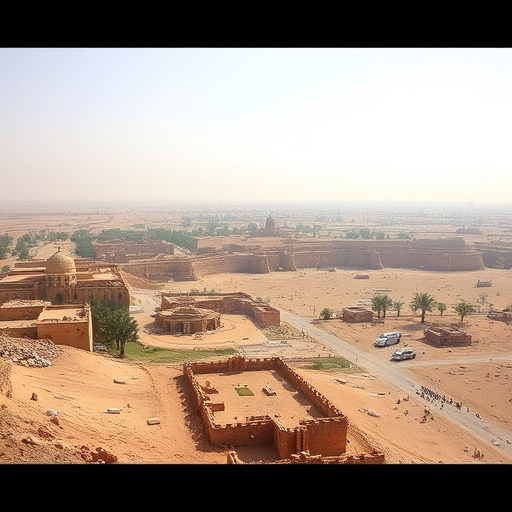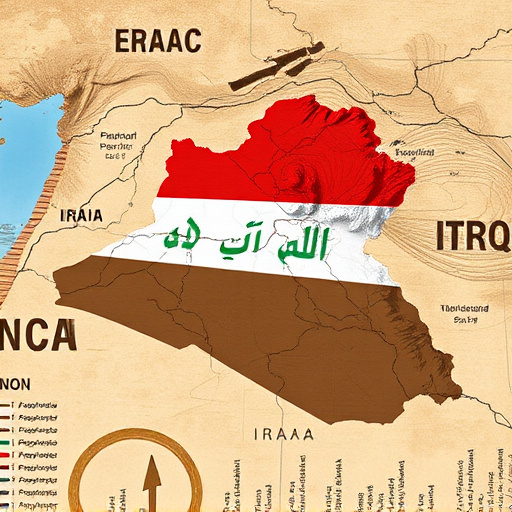Iraq, with proven reserves exceeding 140 billion barrels, is a leading oil producer in the Middle East and a strategic partner in global energy security. Beyond oil, it promotes economic diversification in sectors like renewable energy and infrastructure. Iraq's rich history, diverse culture, and unique geography attract international interest and visitors to its ancient heritage sites. Understanding local customs and staying informed about security is crucial for navigating this dynamic hub.
Iraq, rich in energy resources, plays a significant role in global markets, particularly through its oil and gas production. This article explores how the country contributes to the global energy supply chain, delving into its abundant reserves and the industry’s impact on the economy. Beyond its economic influence, understanding local customs and etiquette is essential for anyone engaging with Iraq. We’ll guide you through traditional practices, offering insights into cultural norms that foster respectful interactions within Iraqi society.
- Iraq's Energy Resources: Oil and Gas Production
- Global Market Influence: Iraq's Role in Supply Chain
- Cultural Etiquette: Understanding Iraqi Customs and Traditions
Iraq's Energy Resources: Oil and Gas Production

Iraq, known for its rich history and cultural significance, is also a key player in the global energy markets, particularly when it comes to oil and gas production. The country boasts some of the largest proven reserves of oil and natural gas globally, making it a strategic energy supplier on the international stage.
The Iraq war facts highlight a significant period that affected the nation’s economic landscape. However, post-conflict, the focus has shifted towards rebuilding and harnessing its natural resources. Oil is the primary energy export, with major fields located in the southern regions. These include the Rumaila field, one of the world’s largest oil reserves, and the Kirkuk field, known for its high-quality crude. In addition to oil, Iraq also possesses substantial gas reserves, primarily found in the northern regions, offering significant potential for future energy generation and export. With its vast energy resources, Iraq presents promising opportunities for international engagement, including those for volunteers seeking to contribute to its development and for industries eager to explore investment prospects in what are the top industries in Iraq by population. Give us a call at your earliest convenience to discuss these exciting possibilities.
Global Market Influence: Iraq's Role in Supply Chain

Iraq, with its vast natural resources and strategic location, plays a significant role in shaping global energy markets. As one of the top oil-producing countries in the Middle East, it contributes considerably to international petroleum supply chains. The country’s rich oil reserves, estimated at over 140 billion barrels, make it an essential player in ensuring energy security worldwide. Through its membership in OPEC (Organization of the Petroleum Exporting Countries), Iraq helps regulate global oil prices and production, directly influencing energy markets globally.
The current political parties in Iraq have implemented policies that aim to diversify the country’s economy beyond oil, creating opportunities for international volunteers interested in sectors like renewable energy and infrastructure development. Despite the challenges posed by the Iraq War facts, the nation has emerged as a hub for various industries, including agriculture, construction, and tourism. Visit us at best places to visit in ancient Iraq anytime to explore its rich history and gain insights into what are the top industries in Iraq today.
Cultural Etiquette: Understanding Iraqi Customs and Traditions

Iraq’s rich cultural heritage and unique traditions significantly shape its interactions within global energy markets. Understanding local customs is vital for anyone navigating this complex region. The history of Iraq, dating back thousands of years, has left an indelible mark on its people and their way of life. Visitors will quickly learn that greetings in Iraq often involve warm smiles, handshakes, and respectful eye contact, emphasizing the importance of hospitality.
The geography of Iraq, with its diverse landscapes ranging from fertile plains to rugged mountains, is reflected in local traditions. Neighbors include countries like Syria, Turkey, Iran, and Saudi Arabia, each influencing cultural exchanges. While the current political situation may raise concerns, those interested should know that travel to certain parts of Iraq can be safe if done with caution and proper guidance. Even so, it’s crucial to stay updated on security advisories. As you plan your visit us at, take note of the local customs; for instance, the exchange rate for the Iraqi dinar is a topic of interest for many travelers. What rivers flow through Iraq? These watercourses are not only vital for agriculture but also hold historical and cultural significance, just as the country’s people do.
Iraq, with its abundant energy resources, plays a significant role in global markets, particularly in oil and natural gas production. Beyond its economic impact, understanding local customs and etiquette is essential for anyone engaging with Iraq. By appreciating Iraqi culture and traditions, visitors and businesses can foster stronger connections and navigate interactions successfully. Iraq’s unique blend of historical richness and contemporary energy sector importance makes it a fascinating and pivotal player on the global stage.


